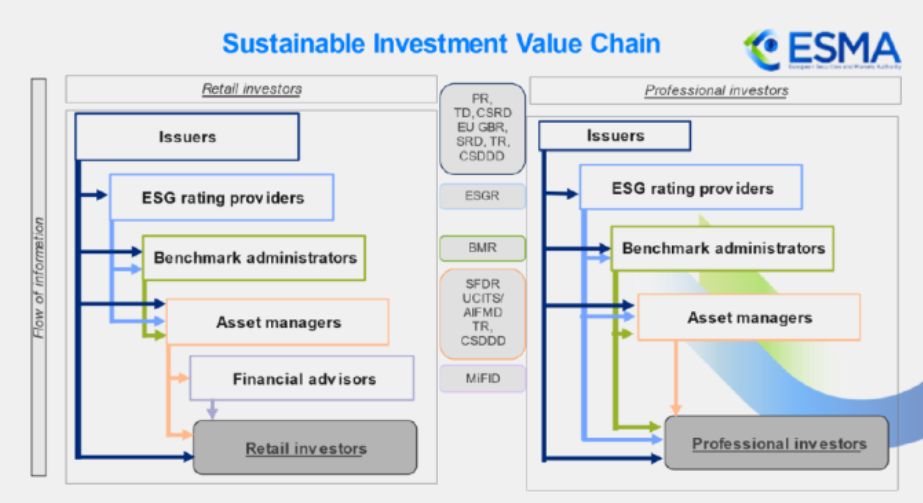- within Environment topic(s)
- with readers working within the Banking & Credit industries
On 24 July 2024, the European Securities and Markets Authority ("ESMA") published an opinion (the "Opinion") outlining its long-term vision for the functioning of the European Union's sustainable finance framework (the "Framework"). This Opinion aims to enhance the usability and coherence of the framework, thereby facilitating the investor journey towards sustainable investments.
Key Reasons for the Opinion
ESMA has identified significant progress in the development of the Framework. Despite these advancements, ESMA and National Competent Authorities believe that further development and evolution of the Framework are necessary to better support sustainable investments. The Opinion draws on findings from the ESMA Progress Report on Greenwashing and aligns with the Joint ESAs Opinion on the Sustainable Finance Disclosure Regulation. Please see our article on the Joint Opinion here.
Holistic Vision for Sustainable Finance
Their Opinion presents a holistic vision for the long-term functioning of the Framework, considering its overall architecture and the interconnectedness between its different components. ESMA emphasizes the need for a coherent and comprehensive sustainable investment value chain to support investment decisions effectively.

Key Recommendations
The Opinion outlines several key areas for improvement.
- EU Taxonomy as the Central Reference Point
- The Sustainable Finance Disclosure Regulation ("SFDR") definition of 'sustainable investments' should, in ESMA's view, be phased out. Alternatively, they consider that using the science-based EU Taxonomy to assess sustainability would bolster robust assessments and mitigate greenwashing risks at the same time.
- Whilst at this time, the EU Taxonomy does not cover all the economic activities that could substantially contribute to the environmental objectives, ESMA advocates for the EU Taxonomy to become the sole reference for assessing sustainability, embedded in all relevant sustainable finance legislation over time.
- The completion of the EU Taxonomy, including the development of a social taxonomy, is in their view essential to ensure comprehensive coverage of all activities that can contribute to environmental and social sustainability.
- Adapted Transparency Requirements
- ESMA propose that all financial products should disclose some minimum basic sustainability information, covering environmental and social characteristics, regardless of the stated sustainability ambition of the product.
- They envisage a sub-set of sustainability disclosures ('vital' information) to be provided to retail investors, while the entire set of sustainability information would be available to all professional and retail investors.
- They explore various options for whether this should cover a sub-set of principal adverse impact indicators or Corporate Sustainability Reporting Directive metrics, but do not land on a settled position as to what such minimum basic sustainability information should cover. This would likely be a significant development, if introduced, as existing Article 6 SFDR funds would then have to provide certain sustainability-related information, regardless of whether the investment strategy and commitments did not consider sustainability.
- Implementation of a product categorisation system
- A product categorisation system should be introduced supporting 'sustainability' and 'transition' as categories, based on a set of clear eligibility criteria and binding transparency obligations. For further information on the proposed categories, please see our briefing here.
- Support for Transition Investments
- The Framework should ensure that more clarity and detailed information on harmful activities is disclosed for investments undergoing transition or decommissioning. To support this aim, ESMA recommends incorporating a legal definition of 'transition investments' into the Framework to support the creation of transition-related financial products.
- ESG data quality
- ESMA sets out that ESG data products should be brought into the regulatory perimeter, the consistency of ESG metrics should continue to be improved and the reliability of estimates ensured.
- Enhanced Consumer and Industry Testing
- ESMA underscores the importance of consumer testing, designed with behavioral science insights, to ensure that policy solutions meet retail investors' needs.
- Industry testing is also crucial to assess the feasibility and
practicality of these solutions.
Supporting the Investor Journey
To facilitate the investor journey, the Framework must provide adequate information and tools, especially for retail investors who may lack the expertise of professional investors. ESMA highlights the necessity of high-quality disclosures and good market conduct to build trust in sustainable investments. The Opinion also stresses the importance of simplifying and harmonizing definitions across the Framework to enhance comparability between products.
Conclusion
ESMA's long-term vision for the Sustainable Finance Framework is aimed at fostering a supportive environment for sustainable investments by improving the framework's usability, coherence, and international interoperability. By addressing these key areas, ESMA seeks to ensure that the Framework more effectively facilitates the transition to a sustainable economy while protecting investors and promoting the competitiveness of EU capital markets.
For more information, please reach out to the Proskauer UK Regulatory team.
The content of this article is intended to provide a general guide to the subject matter. Specialist advice should be sought about your specific circumstances.






